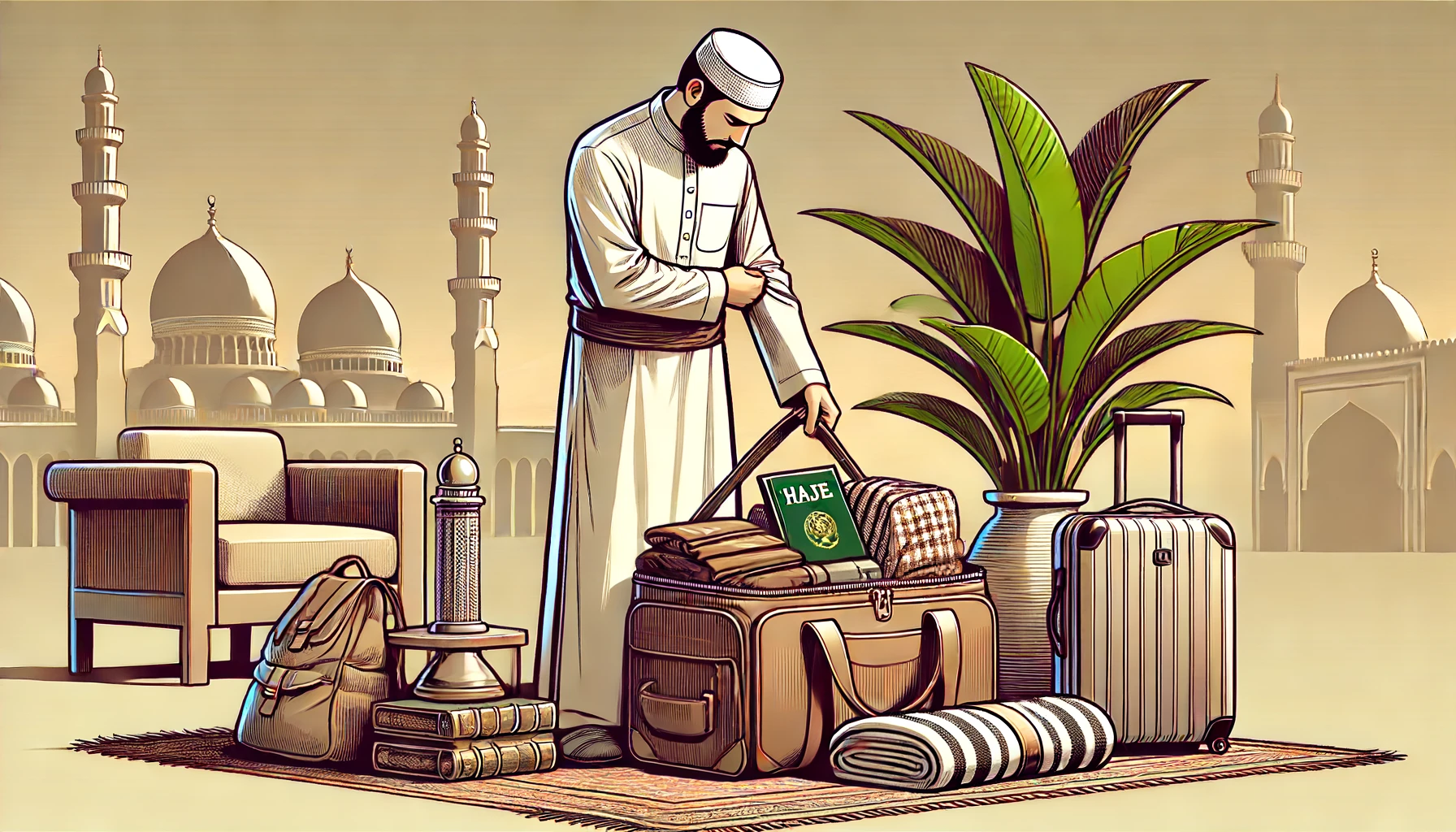Hajj is an important part of Islamic devotion, connecting unity, sacrifice, and submission to Allah. This special pilgrimage is one of the Five Pillars of Islam that guides believers on a journey that transforms them both physically and spiritually. In this important duty, a thing many people are not familiar with, Hajj on behalf of the deceased or someone else.
Learn about the special duty of Hajj, not just for yourself but also for those who have passed away or those facing physical challenges. Let’s discuss the spiritual side of Proxy Hajj, where faith and compassion come together in a beautiful way.
The Prophet’s Guidance on Proxy Hajj
The Juhaynah Incident
Juhaynah Incident, which portrays an incident where a woman from Juhaynah approached Prophet Muhammad (PBUH) with a heartfelt question. She opened up about her late mother’s unrealized dream of undertaking the sacred Hajj pilgrimage. Unfortunately, her mother passed away before fulfilling this aspiration. Filled with sincerity and a genuine desire to honor her mother’s wishes, the woman sought guidance on performing Hajj on her mother’s behalf.
Prophet Muhammad (PBUH) responded with kindness and a clear “yes.” He used a simple comparison, like dealing with money matters, to explain the importance of fulfilling obligations to Allah. The Prophet encouraged the woman to go on the Hajj pilgrimage for her late mother, comparing it to taking care of a family member’s financial responsibilities.
Are you looking for a Reliable Hajj Agency in Bangladesh? Contact Shepherds today.
Understanding the Duties of Hajj on the Deceased
Duties of Hajj on the Deceased
Understanding the important duties of Hajj for someone who has passed away shows how caring and inclusive Islamic teachings are. If a person dies without being able to do Hajj, it becomes the responsibility of their close family, especially the children, to go on this important journey for them.
Hajj is an important part of Islam and every Muslim should do it at least once if they can. But sometimes, for various reasons, a person can’t do it in their lifetime. In that case, their family, especially their children, take on the duty to perform Hajj on their behalf.
.
Referencing the Hadith
A hadith narrated by Ibn Abbas teaches us why it is important to complete the religious duties of someone who has passed away. Prophet Muhammad (PBUH) once said that if a person dies without finishing their important religious duties like Hajj, it becomes the duty of their family to do these tasks.
Badal Hajj
What is Badal Hajj?
Let’s Understand the concept of Badal Hajj in simple terms. Badal Hajj means performing Hajj on behalf of someone else, usually a close family member who couldn’t do it themselves. We’ll explore why this is important in Islamic teachings.
Historical Context
During the time of Prophet Muhammad (PBUH), there were situations where individuals couldn’t fulfill their Hajj duties due to illness or financial constraints. That’s when the concept of Badal Hajj emerged.
Performing Voluntary Hajj on Behalf of Loved Ones
Voluntary Hajj, Charity, and Sacrifices
In showing love for those who have passed away, we explore acts like Hajj, charity, and sacrifices. These deeds, rooted in Islamic teachings and supported by the sayings of Prophet Muhammad (PBUH), go beyond our required duties, becoming ways of expressing love. Hajj, a significant pilgrimage symbolizing dedication to Allah, can be done on behalf of a loved one as a heartfelt gesture.
Charity, an act of selflessness, becomes a lasting gift, reaching the departed soul. Sacrifices, whether literal or symbolic, show deep devotion and commitment to the memory of loved ones. Following the guidance of Prophet Muhammad (PBUH) and relevant sayings, these acts, combined with heartfelt prayers, create a balanced way of expressing love beyond death.
Valid Conditions and Eligibility for Badal Hajj
Valid Conditions for Badal Hajj
Embarking on Badal Hajj involves specific conditions to ensure its validity. Here’s a breakdown of the key criteria that need to be met:
Financial Capability:
If someone wishes to perform Badal Hajj, they need to have enough money. This covers everything like travel, staying there, and other costs related to the pilgrimage.
Physical Capability:
The person doing Badal Hajj (called Ma’moor) should be physically fit to do all the rituals. This ensures that the pilgrimage is done properly on behalf of the person it’s intended for.
Proven Legitimacy:
We need to make sure that the request for Badal Hajj is legitimate. This usually means checking why the person who it’s meant for (Aamir) can’t do Hajj themselves.
Continuous Illness or Physical Impairment:
Badal Hajj is allowed when the person it’s intended for is always sick or physically can’t do the pilgrimage.
Intentions and Sincerity:
Both the person doing Badal Hajj and the one it’s for (Aamir) should have honest intentions. Doing Badal Hajj is all about being devoted and compassionate, so having true motives is really important.
Hadiths and Quranic References on Badal Hajj
Quranic Verses and Hadiths
“An able person is one who is either able to perform Hajj himself or delegate another to perform it on his behalf. The first type requires physical as well as financial ability and that it is safe to travel to Makkah.” – The Shafie book {Umdat As-Salik, P.122}
“It is a condition that the person on whose behalf Hajj will be performed is unable to perform it himself i.e. deceased, suffers a broken body part, has a chronic disease or of old age.”- An-Nawawi {V.3:12}.
Al Fadl Ibn Abbas, a cousin of Prophet Muhammad (PBUH), had an important role in the Hajj pilgrimage. Once, a woman wished to perform Hajj but couldn’t due to physical limitations. Recognizing her sincere desire, Al Fadl Ibn Abbas compassionately offered to do the pilgrimage on her behalf. – Sahih Bukhari, Volume 2, Book 26, Number 589:
Clarifying Misconceptions
You can’t do Proxy Hajj for two or more people at the same time. Also It is not allowed to do Proxy Hajj for someone who doesn’t have enough money or can’t afford the pilgrimage because Hajj is not mandatory for them.If someone tries to make money by doing Proxy Hajj, it’s not acceptable either. Proxy Hajj can’t be done for someone who can’t go on Hajj due to security or political issues.
Final Words
Hajj is an important pilgrimage of Islam that combines unity, sacrifice, and surrender to Allah, greatly impacting pilgrims both physically and spiritually. Moving beyond personal duties, our journey uncovers the lesser known practice of Hajj on behalf of those who have passed away or face challenges.
Exploring Badal Hajj brings to light its humanitarian side showing community support. Voluntary acts, like Hajj, charity, and sacrifices, emerge as expressions of enduring love, finding the right balance between tangible acts of devotion and sincere prayers from the heart.
Check Shepherds Hajj Packages from Bangladesh.





